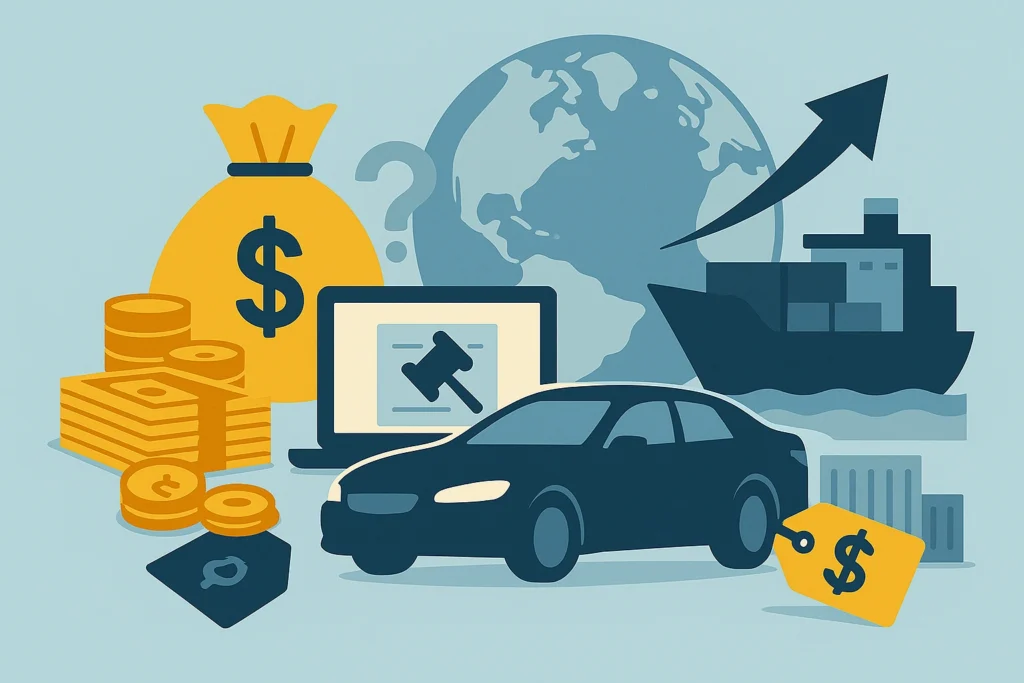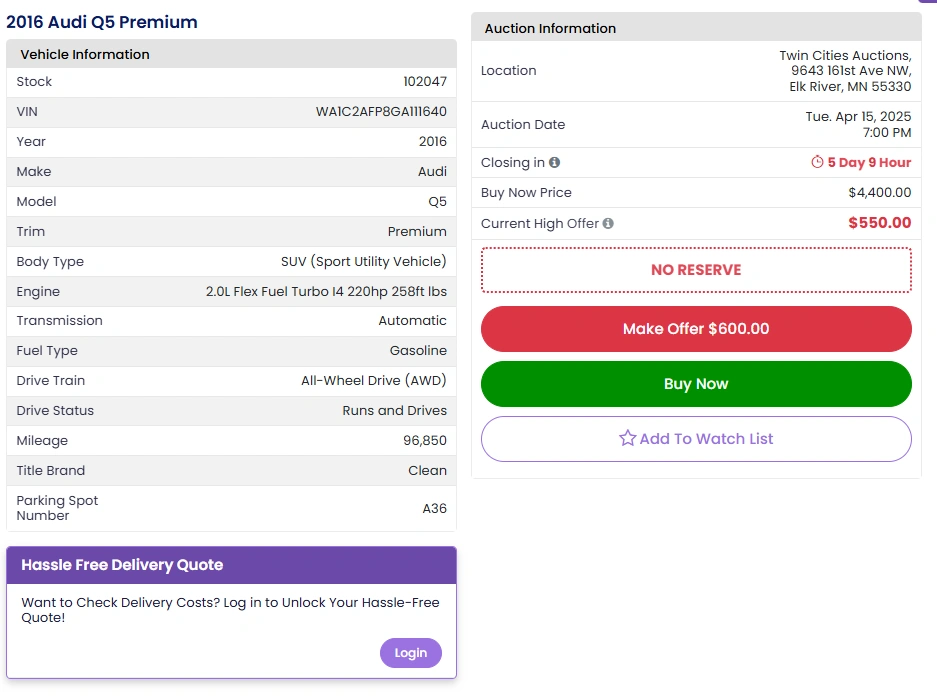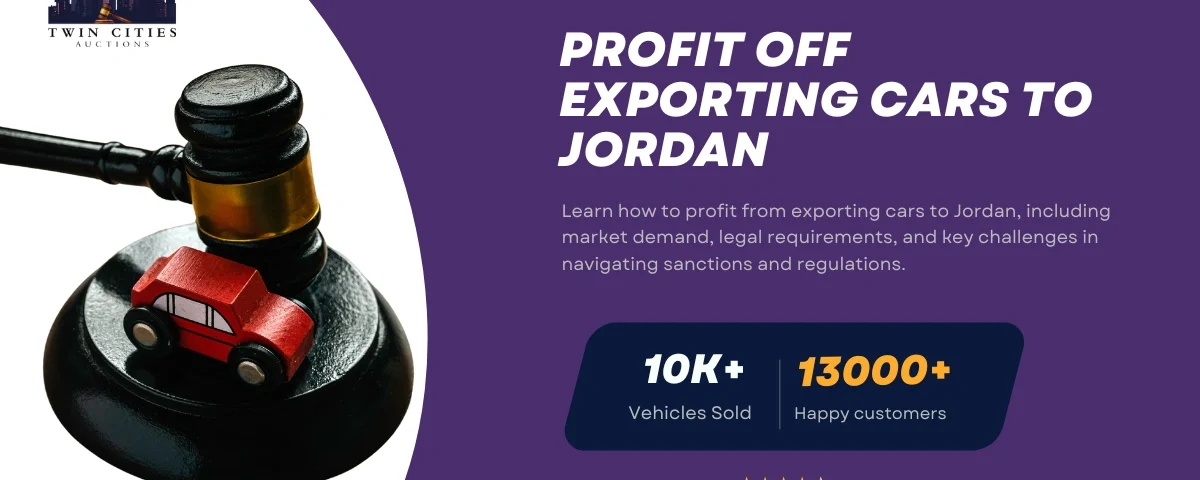Did you know that in 2023 Jordan brought in around 25,000–28,000 vehicles, worth about $140–$160 million and rising at 7 percent per year?
U.S. exporters entering this market have seen profit margins climb by as much as 18 percent within six months. Here’s how to meet Jordan’s import rules, calculate your costs, and streamline logistics for maximum gain.

Key Takeaways
- Growing Import Market: In 2023, Jordan imported approximately 25,000–28,000 vehicles, valued between $140–$160 million, reflecting a steady annual growth rate of around 7%.
- Mandatory Documentation: Essential documents for vehicle importation include a commercial invoice, bill of lading, import permit from the Customs Department, and a certificate of conformity to verify safety and emissions compliance.
- Primary Entry Point: The Port of Aqaba serves as Jordan’s main maritime gateway, with transit times ranging from 20 to 35 days depending on the U.S. port of departure.
- Payment Security Measures: Utilizing letters of credit is advisable for new trade relationships or large shipments to ensure payment security, while escrow services can offer balanced protection for mid-tier transactions.
- Currency Risk Management: To mitigate fluctuations in the USD/JOD exchange rate, consider employing forward contracts through major Jordanian banks.
Understanding the Jordanian Market
Jordan’s auto market is shaped by both economic constraints and geographic diversity, leading to distinct preferences between urban and rural buyers.
In cities like Amman, fuel efficiency and ease of parking make compact sedans and crossovers the top choice.
In contrast, rural areas and commercial sectors often demand robust SUVs and pickups for navigating tougher terrain.
U.S.-origin vehicles enjoy a reputation for durability and comfort, giving them a competitive edge if priced right.
Total vehicle imports (all types) are estimated at 25 000–28 000 units, valued at 140–160 million USD in 2023. Amman buyers favor compact sedans and crossovers for urban efficiency, while rural and commercial sectors use SUVs and pickups.
| Metric | Figure |
| Vehicles Imported | 25 000–28 000 units |
| Estimated Market Value | 140–160 million USD |
| Year‑over‑Year Growth | Approximately 7 percent |
Source: Jordan Department of Statistics
Regulations and Compliance
Importing a vehicle into Jordan involves navigating a structured but strictly enforced regulatory process. The ten-year age limit means older vehicles are rejected at customs, regardless of condition, which can result in costly returns.
Documentation must be thorough and accurate, as errors on the bill of lading or missing conformity certificates can cause clearance delays. Staying up-to-date with changes from Jordan Customs ensures smoother transactions and fewer surprises.
Jordan enforces a ten‑year age limit on passenger‑car imports and requires a certificate of conformity. An import permit from the Customs Department is mandatory.
| Document | Purpose | Required For |
| Commercial Invoice | Declares sale value | All imports |
| Bill of Lading | Proof of maritime shipment | Sea‑borne imports |
| Import Permit | Government authorization | Vehicle imports |
| Certificate of Conformity | Verifies safety and emissions compliance | All imports |
Source: Jordan Customs Department
Building Your Landed Cost and Profit Model
Profit margins in the Jordanian market can be solid—but only if you build your cost model carefully. Beyond the standard 25% import duty and 16% VAT, smaller fees like documentation handling and port charges can quietly add up.
Use this structure for accurate cost modeling:
| Cost Item | Rate | Calculation Example (USD) |
| CIF Cost | — | 10 000 |
| Import Duty | 25 percent | 2 500 |
| Sales Tax (VAT) | 16 percent | (10 000 + 2 500) × 0.16 = 2 000 |
| Miscellaneous Fees | 1.5 percent | 10 000 × 0.015 = 150 |
| Total Landed | — | 14 650 |
Source: Jordan Customs Department
Logistics and Shipping Routes
The Port of Aqaba serves as Jordan’s primary maritime gateway for vehicle imports. Shipping options include Roll-On/Roll-Off (RoRo) and container shipping, with transit times varying based on the U.S. port of departure.
For example, shipments from the U.S. East Coast typically take 25–30 days, while those from the Gulf Coast may arrive in 20–25 days.
| Route | Transit Time | Notes |
| U.S. East Coast → Aqaba | 25–30 days | Mediterranean + Red Sea crossing |
| U.S. Gulf Coast → Aqaba | 20–25 days | Shorter sea leg |
| U.S. West Coast → Aqaba | 30–35 days | Through Suez Canal |
Source: Maersk
Financing and Payment Security
Exporters often face payment uncertainty when entering new markets like Jordan, making risk-mitigation strategies essential.
Letters of credit remain the safest option, especially for first-time transactions or high-value vehicles.
Escrow services are gaining popularity for mid-tier deals, offering balance and buyer protection without as much paperwork.
To protect profits, it’s also wise to monitor USD/JOD exchange rates and lock in pricing through hedging tools offered by Jordanian banks.
Select terms to balance risk and cash flow:
| Method | Risk Level | Best Use |
| Letter of Credit | Low | New relationships; large shipments |
| Open Account | High | Trusted, recurring buyers |
| Escrow | Medium | Ensures delivery before payment |
Source: U.S. Export‑Import Bank
Mitigate USD/JOD fluctuations with forward contracts through Jordan’s major banks.
Common Pitfalls to Avoid
- Underestimating combined duty and VAT erodes margins
- Missing import permit delays clearance
- Overlooking age‑limit enforcement leads to rejections
Use the Customs pre‑shipment checklist to verify all documentation.
Source: Jordan Customs Department
Why Auctions Are a Smart Choice for Car Purchases
Auctions can be an excellent source for late-model vehicles with clear chains of title and affordable pricing. Twin Cities Auctions, based in Minnesota, is one such reputable auction house that offers a wide range of vehicles at competitive prices.
Key Benefits of Buying from Auctions:
- Wide Selection: Auctions like Twin Cities Auctions offer a variety of vehicles, from low-budget cars to high-end models.

- Competitive Pricing: Auctions often offer vehicles at prices below retail value, enabling dealers to maximize their profit margins.

- Transparency: Auctions provide full vehicle history reports, so you know exactly what you’re buying.

- Convenient Bidding: Many auctions offer online bidding for your convenience, making it easier to source vehicles without being physically present.
Twin Cities Auctions: A Smart Vehicle Sourcing Choice
For those in the automotive industry, Twin Cities Auctions offers an excellent platform for sourcing quality vehicles at competitive prices.
Whether you are just starting or expanding your business, this auction house provides transparency, competitive pricing, and a broad selection.
| Feature | Description |
| Inventory Variety | Wide range of cars, trucks, and SUVs available |
| Competitive Pricing | Below-market pricing allows for higher profit margins |
| Vehicle History Reports | Detailed history reports for every vehicle |
| Online Bidding | Convenient online bidding options for dealers |
| Financing Options | Financing available to help with inventory purchases |
Conclusion
Jordan’s stable economy and growing demand for vehicles present a strong opportunity for U.S. exporters. By mastering cost calculations, ensuring compliance, optimizing logistics, and sourcing strategically, you can achieve healthy profit margins.
Ready to Buy or Sell Your Car? No Dealer License Needed!
At Twin Cities Auctions, we simplify the process of buying and selling vehicles, making it straightforward and hassle-free. You don’t need a dealer license to participate—our online platform is open to the public, accommodating both first-time buyers and seasoned sellers.
Whether you’re upgrading your ride or selling your current vehicle, we provide the platform you need that offers a diverse range of vehicles and a transparent bidding process. Start your auction journey with us today!
Looking for more options? Explore our comprehensive list of all available car auctions across the United States. Your next deal might be just a click away!
FAQ
What are Jordan’s auto import duties?
Import duty is 25 percent of CIF value plus VAT of 16 percent.
Can I export used cars to Jordan?
Yes—vehicles must be no older than ten years and hold a certificate of conformity.
What age restrictions apply?
Imports must be manufactured within the last ten years.
How long does customs clearance take?
Typically five to seven business days with complete documentation.
Are emissions tests mandatory?
Yes—certificate of conformity must verify compliance with national standards.


